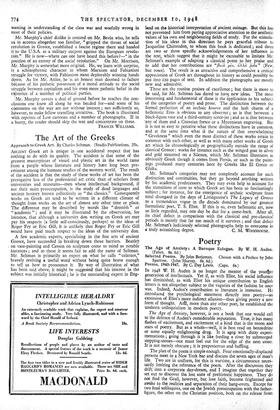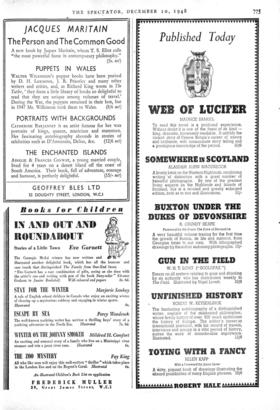Poetry
The Age of Anxiety : A Baroque Eclogue. By W. IL - Auden. (Faber. 8s. 6d.)
Selected. Poems. By John Betjeman. Chosen with a Preface by John Sparrow. (John Murray. 8s. 6d.)
Poems, 1943-1947. By C. Day Lewis. (Cape. 6s.) IN 1948 W. H. Auden is no longer the mentor of the yourter generation of intellectuals. Yet if, as with Eliot, his social influence has diminished, as with Eliot his unique contribution to English letters is not altogether subject to the vagaries of the fashion he once was. Indeed, Auden's contribution to literature is immense. He introduced the psychological statement directly into poetry—an extension of Eliot's more indirect allusion—thus giving poetry a new form of thought. Mid, more than any other poet, he established the unshorn colloquialism in modem poetry.
The Age of Anxiety, however, is not a book that one would call to the defence of Auden's considerable reputation. True, it has many flashes of excitement, and excitement of a kind that is the moon and stars of poetry. But as a whole—well, it is best read on benzedrine or some equally enlightening drug. It is agog with dizzy experi- mentations ; going through it is like fording a river by submerged stepping-stones—one must feel out for the edge of the next stone. It is not merely obscure ; it is preposterous and baffling.
The plan of the poem is simple enough. Four emotionallyLdisplaced persons meet in a New York bar and discuss the seven ages of man's life. Two are in uniform, for this is wartime, a circumstance neces- sarily limiting the reference of the poem. After the discussion they drift, into a corporate daydream, and I imagine that together they set out to discover the, lost state of prehistoric happiness. They do not find the Grail however, but lose faith, become frightened and awake to the realities and separation of their hang-overs. Except for two final soliloquies, one on the Jewish preoccupation with the father- figure, the other on the Christian position, both on the release from private sin, the rest of the poem is relatively unimportant, consisting of descriptions of various degrees of hang-over. The marrow of the poem is, of course, the day-dream journey ; the search for that primaeval happiness which, in the Auden conception, " can only be imagined in terms of a landscape bearing symbolic resemblance to the human body." With that one hint we are left to flounder after the poet's meanings. It is improbable that many readers will enjoy. such a game of blind-man's-buff.
The four travellers begin, one can :only guess, at the eyes—" a sad plain . . . rimmed with rushes" ; the eyeball is a " tacit tarn." They then travel " the stony pass" to the nose ; " from here on a clear day both coasts (i.e. ears) are visible." The second stage, for which they divide into pairs, is the double journey to the ears—" these ancient lzarbours" and " rival ports." -On this journey from nose to ears the younger pair, Rosetta and Emble, travel by car, and the older, Quant and Malin, on foot. Rosetta, a successful buyer for a big department store, and Emble, an uncertain but vain youth who seems to have stepped straight out of Geoffrey Gorer's recent work, The Americans, as the prototype of the young American male, become attracted to each other. Their interplay provides grist for the remainder of the poem. So the journeying continues—from the mouth (here there is a fine trolley-car ride about the teeth) to the navel. Last, confronted by the stomach.
" Boring and bare of shade, Devoid of souvenirs and voice,
It takes will to cross this waste,"
they find themselves lacking the will and they awake.
Now, although all this curious travelling is symbolically an exploration of the body, its philosophical or allegorical implications are nowhere communicated intelligibly ; the point is lost. Auden has failed in what is, at all times, most reasonably to be expected of a poet—communication. And any reviewer must be tempted, like the proverbial American judge, " to throv5 the ,,book at him." As a teacher, Auden is still faithful to much of the doctrine he pro- pounded to his first class ; the familiarity of one's own devils, the : seduction of neurosis. He is fascinated by the tenacity with which sufferers cling to their wounds.
" We would rather be ruined than changed, We would rather die in our dread Than climb the cross of the moment And let our illusions die."
What one loses in sense in The Age of Anxiety is partly made up for in craft. Auden is, indeed, the supreme craftsman. It seems that every long poem must have its boring passages, and The Age of Anxiety is no exception, yet here boredom is at a minimum. Again and again the fin of true Riptic genius cuts through the surface. The reader is left aware that although, as a whole, this is not even a good poem, it was written by a great poet. The dedication of The Age of Anxiety is to John Betjeman, who deserves it. Indeed, John Betjeman deserves much, for he is that rarity, a poet who chooses his own limitations and is completely successful within them. Auden sets himself a big test, and fails ; Betjeman a lesser test, and passes it, taking again the prize of the senior freshman year. This is not to belittle Betjeman, but to place him. The Selected Poems of John Betjeman are the mirrors of
that motley, summer_ middle class, who blush when their partners whisper "Love Forty," who spread the picnic cloth much as Pitt once spread the map of Europe. In verse, Betjeman is similar to Osbert Lancaster in cartoons. The ghoulish schoolgirls in gym tunics, the squireen in tweeds, the virago's stance—all are faithfully, affectionately reproduced. Auden wrote of the suburbs almost in fear of them ; the rector's teacup trembled on his knee. On the other hand, Betjeman takes a macabre delight in the suburbs. When he blows, the walls of the semi-detached, Jericho-like, come down ; he likes what he sees, he has found the nest, so he pokes it and then—his poems should be read.
John Betjeman is a minor poet, but an original one. The exactness of his expression, the lightness with which he lays down serious moods, the disarming way he codifies the unwritten and terrifying laws of middle-class behaviour, are the works of a master. Betjeman is no comic ; he is a true satirist in the Praed tradition, but with more poetic vision than that parson. He is nostalgic, but unsenti- mental. Irishmen still talk of Betjeman's sojourn in Dublin with expansive appreciation. When one reads this verse it is easy to see why, for in Ireland, too, John Betjeman got below the surface of the life he described.
" There in pinnacled protection, One extinguished family waits
A Church of Ireland resurrection
By the broken, rusty gates.
Sheepswool, straw and droppings cover Graves of spinster, rake and lover, Whose fantastic mausoleum Sings its own sea-blown Te Deum,
In and out the slipping slates."
The latest poems of C. Day Lewis are a disappointment. They lack ignition. Day Lewis has, indeed, the range of expression of a first-rate poet, the aim, the sensitivity, but not the effect. The poet's work must have some application wider than the intimacies of the experiences which produce it ; but reading Day Lewis is like reading a personal notebook. He has passion and pain, but it is the passion and pain of a man in another city, not yours. There is little grip in his work. This was not always so. Overtures to Death (1938) and Word Over All (1943) did grip, did ignite, did apply, and, in good measure, promised for the future. Now, this is that future, and the promise has not been observed. The vigour in Day Lewis's present poems, Poems, 1943-1947, is confined to an intrinsic technical vigour. They are like minnows in a schoolboy's net, lively, flashing, but small fry. The broken rhythms, the cleverly slipped rhyhmes, the profuse—if over-coloured—imagery are evidence both of Day Lewis's technical ease and the fertile quality of his imagination. Very rarely, too, as in Married Dialogue, he does manage some enlargement of the personal experience. It is a pity that he fails to sustain this quality throughout. At present, Day Lewis is under the influence of Hardy, who should be a corrective to the over-personalised statement. But Hardy's influence is not yet absorbed. It floats on the top of these poems as oil on water. Poems, 1943-1947, do not fill a gap in -Day Lewis's work ; they make one. Yet, he is working towards an end. Perhaps his next book will be the one to put your shirt on,. H. A. L. CRAIG.















































 Previous page
Previous page